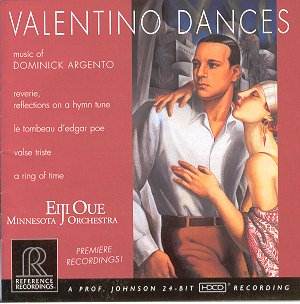DOMINICK ARGENTO (b. 1927)
Valentino Dances - suite from the opera (1994)
Reverie, Reflections on a Hymn (1998)
Le Tombeau d'Edgar Poe - suite from the opera The Voyage
of Edgar Allen Poe (1976)
Valse Triste (1996)
A Ring of Time (1972)
 Minnesota Orchestra/Eiji Oue
Minnesota Orchestra/Eiji Oue
rec 19 Feb and 28 Sept 1999, Minneapolis
 REFERENCE RECORDINGS
RR-91CD
[65.07]
REFERENCE RECORDINGS
RR-91CD
[65.07]
Crotchet

I have known Argento's name for many years but have not, until now, heard
anything of his.
Valentino Dances is a luxuriant orchestral mélange in which
the worlds of the Tango, Rosenkavalier, Samuel Barber and Elgar meet.
There are prominent roles for the saxophone and a waspishly seductive accordion.
The treatment is comparable with the popular songs and dances in the works
of Peter Maxwell Davies (PMD certainly has a way with the foxtrot!) although
the 'casing' is more honeyedly romanticised.
In Reverie, the hymn (distantly sung part way through the piece) referred
to in the title is Ellacombe, a favourite of Argento's. Again romanticism
(try 7.40) is in the ascendant but this time in collision with a Bach-like
grandeur. If you can imagine the solo piano part in Finzi's Grand Fantasia
and Fugue gothically orchestrated you will have an approximation of the
sound.
The Poe suite is from twenty years previously and the expression is more
languidly Bergian (a little like Franz Schmidt's strings in the Fourth Symphony)
than the Reverie or the Valentino piece. It is far from rebarbative
but does not surrender to the melodic harvest as readily as his later works.
Chad Shelton (tenor) sings (offstage) various verses from Poe's 'Annabel
Lee' and these divide or provide a series of pivots for this mournful and
storming nightmare suite. It is drawn from an opera written for Bicentennial
year, 1976.
The Valse Triste is a gentle cousin to Sibelius's own piece of the
same title. Do I hear a hint of 'Happy Birthday' in the music as well as
a touch of Elgar's Salut d'Amour?
A Ring of Time is the longest piece in this collection. It is also
the earliest - commissioned for the orchestra's 70th birthday and conducted
in that season by Stanislaw Skrowaczewski. It was written in Florence where
church bells must have inspired the bell-carilloned score. The full orchestra
is joined by three percussionists each with her or his own chime of bells
in addition to their usual percussive complement. The first two seasons:
Spring and Summer seemed very similar to me. Fall is
jaggedly dynamic - evocative of leaf-chilling gusts and the old 'Apple Tree
Shaker' beloved of Thomas Hardy with his grimly cheery tumbril. There is
a touch of Malcolm Arnold at 3.10. Winter is bitterly crooned and
recalls William Alwyn's Fifth Symphony in cahoots with Mahler's Adagietto
or Silvestrov's Fifth Symphony. So ends what amounts to a condensed version
of the 'Seven Ages of Man'.
Literate notes by Mary Ann Feldman provide you with as much background as
you are likely to need.
The recording is exemplary - open and alive to the richness of Argento's
writing.
I do urge you to hear this music.
Rob Barnett

